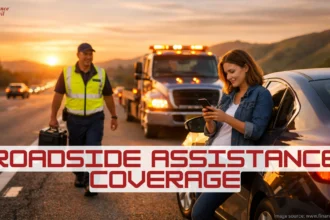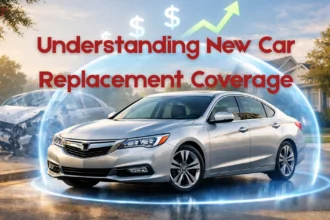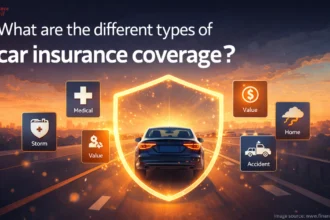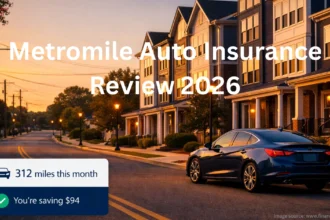
Introduction
If you’ve been researching affordable car insurance options, you’ve probably come across Farm Bureau Insurance, a company that’s been serving American drivers since 1939. But here’s the catch: you can’t just buy a policy from them. You’ll need to purchase an annual membership first, typically costing between $30 and $50.
So is Farm Bureau auto insurance worth that extra fee? Many drivers are surprised to learn they’re paying more than necessary for coverage. With Farm Bureau ranking 20th nationally among insurance providers, you deserve to know exactly what you’re getting and whether better options exist for your specific situation.
This comprehensive guide breaks down everything you need to know about Farm Bureau auto insurance: real costs, customer experiences, coverage options, and how it stacks up against competitors. Whether you’re a rural driver, a young person just starting out, or someone looking to bundle policies, we’ll help you make an informed decision.
The Real Cost Problem: Why American Drivers Overpay
Here’s a sobering fact: the average American driver could be overpaying for car insurance by 30% or more. According to recent industry data, most people stick with the same insurer for years without comparing rates, costing them hundreds, even thousands, of dollars annually.
The insurance landscape has changed dramatically in recent years:
- Inflation impact: Repair costs have skyrocketed due to supply chain issues and advanced vehicle technology
- Rising claim frequency: Distracted driving and severe weather events have increased accidents nationwide
- Technology costs: Modern vehicles with sensors, cameras, and computer systems cost significantly more to repair
- Regional variations: Your ZIP code can impact your rate by 40% or more
Farm Bureau operates in this challenging environment, but how do their rates actually compare? Let’s break down the numbers.
Farm Bureau Auto Insurance: The Complete Overview
What Sets Farm Bureau Apart
Farm Bureau isn’t your typical national insurance carrier. Founded in 1939 to serve America’s farming communities, it operates through state-based offices and local affiliates rather than as a single nationwide company. This structure gives it strong regional expertise but also means coverage availability and service quality can vary significantly by location.
Key Facts:
- Available in 23 states through Farm Bureau Property & Casualty and local affiliates
- Requires annual membership ($30-$50) to purchase coverage
- Ranks 20th nationally for overall insurance quality
- Earns 4th place for customer experience
- AM Best financial strength rating: A (Excellent)
The Membership Requirement: What You Need to Know
Unlike most insurers, Farm Bureau requires you to become a member before buying coverage. Here’s what that means:
Annual Membership Benefits:
- Access to Farm Bureau insurance products
- Discounts on local products and services
- Advocacy for agricultural and rural issues
- Participation in community programs
- Voting rights on policy issues (higher membership tiers)
The Bottom Line: If the insurance savings exceed the membership fee, it’s worth it. For many rural and agricultural drivers, Farm Bureau’s understanding of their unique needs justifies this requirement.
How Much Does Farm Bureau Auto Insurance Really Cost?
National Average Rates
Based on comprehensive data analysis, here’s what Farm Bureau customers actually pay:
Monthly Premiums:
- Minimum coverage: $49 (or $93 by some estimates)
- Full coverage: $132 (or $191 by alternative data)
- National comparison: Slightly above average
Annual Premiums:
- Minimum coverage: $564-$1,116
- Full coverage: $1,500-$2,292
Where Farm Bureau Ranks for Affordability
Farm Bureau ranks 18th nationally for overall affordability, meaning 17 companies offer cheaper rates. However, this varies significantly by driver profile and location.
State-by-State Cost Comparison
Farm Bureau’s rates vary dramatically across its service area:
| State | Monthly Minimum | Monthly Full | vs. State Avg | Affordability Rank |
| Virginia | $30 | $61 | -39% | 3rd |
| Tennessee | $27 | $85 | -25% | 3rd |
| South Carolina | $45 | $88 | -32% | 3rd |
| Arkansas | $32 | $88 | -25% | 2nd |
| Mississippi | $37 | $102 | -23% | 2nd |
| Louisiana | $87 | $212 | -11% | 5th |
| Idaho | $27 | $73 | -13% | 6th |
| Kansas | $45 | $167 | +32% | 10th |
| Nebraska | $43 | $168 | +42% | 10th |
| South Dakota | $37 | $162 | +44% | 11th |
Key Insight: Farm Bureau performs best in Southern states, where it ranks among the top 3 most affordable options. In Midwest states like Nebraska and South Dakota, rates run 40%+ above state averages.
How Different Drivers Are Affected
Farm Bureau’s affordability varies dramatically by driver profile:
| Driver Type | Monthly Minimum | Monthly Full | National Rank |
| Adult drivers (clean record) | $47 | $125 | 18th |
| Senior drivers (65+) | $56 | $135 | 12th |
| Young drivers (under 25) | $103 | $257 | 18th |
| Drivers with speeding ticket | $54 | $144 | 17th |
| Drivers with at-fault accident | $62 | $166 | 17th |
| Drivers with DUI | $90 | $237 | 21st |
| Drivers with bad credit | $99 | $249 | 24th |
Bottom Line: Farm Bureau offers competitive rates for seniors and drivers with violations (speeding tickets, accidents), but young drivers and those with bad credit pay significantly more than competitors charge.
Customer Experience: What Real Policyholders Say
Farm Bureau ranks 4th nationally for customer experience, an impressive achievement. But dig deeper, and you’ll find experiences vary dramatically by state and local office.
The Positive Experiences
Strong Agent Relationships: Real customer feedback highlights personal service as Farm Bureau’s biggest strength:
“My Farm Bureau agent lives in our community and understands our farming operation. When I need to adjust coverage for seasonal workers or equipment, they know exactly what I’m talking about.”
“The personal service is outstanding; my agent has been handling our family’s insurance for 15 years and knows our farm, our vehicles, and our needs inside and out.”
Rural and Agricultural Expertise: For drivers in farming communities, Farm Bureau’s understanding of rural life is invaluable:
“Farm Bureau’s rates for rural drivers are unbeatable; they actually understand that we drive different roads and face different risks than city folks.”
“When my truck hit a deer on a county road, my Farm Bureau agent knew exactly what to expect and how to handle it. They understand that hitting wildlife is just part of rural life.”
The Problem Areas
Inconsistent Claims Handling: Customer complaints reveal significant issues with claims processing:
From ConsumerAffairs (1.0 rating, 336 reviews):
- “The adjuster that came to look at the car didn’t want to help actually get my car fixed. He really preferred me to pay for my own car.”
- Adjusters who “don’t want to help actually get your car fixed”
- Lengthy delays without contact
- Systematic claim denials even for long-term customers
Communication Breakdowns: Multiple customers report frustrating service experiences:
“I was treated in an unprofessional manner by a claim specialist… She communicated with me in a condescending tone, reminiscent of speaking to a young child.”
“Some customers praise responsive agents who ‘take time to answer questions,’ while others report agents who ‘never call back,’ don’t answer emails, and provide poor communication when policy issues arise.”
Roadside Assistance Failures: “I had a flat this morning and called Farm Bureau to get roadside assistance, which my policy includes… I waited for about an hour before deciding to take care of the problem myself. When I had finally gotten my tires replaced and was back home, I contacted Farm Bureau to find out what had happened to my claim and all they could tell me was that someone canceled it.”
Industry Ratings Breakdown
| Rating Source | Score | What It Means |
| AM Best Financial Strength | A (Excellent) | Strong ability to pay claims |
| J.D. Power Claims Satisfaction | 849/1,000 | Above average (varies by state) |
| NAIC Complaint Index | 0.07-0.42 | Far below average complaints |
| ConsumerAffairs Rating | 1.0 out of 5 | Based on 336 reviews |
| Better Business Bureau | 3 negative reviews | Limited data available |
The Reality: Farm Bureau has excellent financial stability and relatively few official complaints, but customer review sites paint a more concerning picture of claims handling and service inconsistency.
Coverage Options: What Farm Bureau Offers

Standard Coverage
Farm Bureau provides all the essentials required by law and recommended by experts:
Basic Coverages:
- Liability coverage (bodily injury and property damage)
- Collision coverage
- Comprehensive coverage
- Medical payments coverage (MedPay)
- Uninsured/underinsured motorist coverage
- Personal injury protection (PIP) in no-fault states
Unique Add-On Coverages
Farm Bureau differentiates itself with several specialized options:
1. Replacement Cost Coverage
- Pays for a new vehicle of similar make/model if yours is totaled
- Available for vehicles up to 4-5 model years old (varies by state)
- Particularly valuable for newer vehicles that depreciate quickly
2. Emergency Roadside Assistance
- 24/7 availability: Call 1-800-226-6383
- Services include:
- Towing
- Flat tire changes
- Battery jump-starts
- Lockout service
- Fuel delivery
- Coverage up to $200 ($500 for farm trucks/RVs)
- Warning: Customer reviews indicate service reliability issues
3. Driveology® Usage-Based Insurance
- The telematics program monitors driving habits
- The device plugs into your vehicle
- Initial discount: 10%
- Maximum potential savings: Up to 50%
- Rewards safe driving behaviors
4. Young Driver Safety Program
- For drivers under 25
- Requires completion of safety training
- Discount: Up to 25%
- Helps offset high young driver premiums
5. Gap Insurance & Mechanical Breakdown Insurance
- Available through Farm Bureau Bank
- Gap insurance covers loan/lease shortfalls
- Mechanical breakdown insurance extends warranty-like protection
6. Rental Car Reimbursement
- Covers rental costs while your car is repaired
- Included with full coverage in some states at no extra charge
What Farm Bureau Doesn’t Offer
Compared to larger national carriers, Farm Bureau has notable gaps:
- Rideshare coverage (Uber/Lyft)
- Classic/collector car insurance
- Accident forgiveness (limited availability)
- Vanishing deductible programs
- Pet injury coverage
- Custom parts and equipment coverage
Bottom Line: Farm Bureau offers solid standard coverage with a few unique features for rural drivers but lacks the extensive customization options available from competitors like State Farm, Progressive, or Geico.
Farm Bureau Auto Insurance Discounts: How to Save
Farm Bureau offers 14 different discounts, with potential savings up to 50%. Here’s the complete breakdown:
Available Discounts
| Discount Type | Savings | Requirements |
| Farm Bureau Member’s Choice Bundle | Varies | Bundle auto + home insurance |
| Driveology® Usage-Based | 10% initial, up to 50% max | Install telematics device, drive safely |
| Claim-Free | Varies by state | Maintain clean claims history |
| Good Student | Varies | Maintain B average or higher |
| Safe Young Driver | Up to 25% | Complete Young Driver Safety program |
| Low Mileage | Varies | Drive 7,500 miles or less annually |
| Multi-Car | Varies | Insure multiple vehicles |
| Loyalty (Continued In-Force) | Varies | Renew policies continuously |
| Pay in Full | Varies | Pay annual premium upfront |
Maximizing Your Savings Strategy
For Young Drivers:
- Complete the Young Driver Safety Program (up to 25% off)
- Maintain good grades (Good Student discount)
- Consider Driveology® to prove safe driving habits
- Stay on parents’ policy if possible
For Families:
- Bundle auto and home for Member’s Choice discount
- Add all household vehicles for multi-car discount
- Drive safely to maintain claim-free status
- Pay annually if cash flow allows
For Rural/Low-Mileage Drivers:
- Track annual mileage to qualify for low-mileage discount
- Use Driveology® to document safe rural driving
- Bundle farm/ranch insurance if applicable
Who Should (and Shouldn’t) Choose Farm Bureau Auto Insurance
Farm Bureau Works Best For:
Rural and Agricultural Drivers
- Deep understanding of farm vehicle needs
- Expertise with rural driving conditions
- Knowledge of seasonal use patterns
- Specialized farm/ranch insurance options
Senior Drivers (65+)
- Ranks 12th nationally for senior affordability
- Average monthly full coverage: $135 (9% below national average)
- Patient, personalized agent service
Drivers with Violations
- Competitive rates for speeding tickets (17th nationally)
- Fair pricing for at-fault accidents (17th nationally)
- Understanding approach to rural driving challenges
Drivers with Older Vehicles
- Affordable coverage for aging cars
- Flexible coverage options
- Cost-effective liability-only policies
Bundle-Focused Customers
- Strong Member’s Choice bundling program
- Comprehensive product lineup (auto, home, life, farm)
- Single-agent relationship across policies
Farm Bureau Is NOT Ideal For:
Young Drivers (Under 25)
- Ranks 18th nationally for young driver affordability
- Average monthly full coverage: $257
- Better options: Geico, State Farm, or staying on parents’ policy
Drivers with Bad Credit
- Ranks 24th nationally for bad credit affordability
- Average monthly full coverage: $249 (1% above national average)
- Better options: Progressive, The General, or Acceptance Insurance
Urban Drivers
- Limited presence in major metropolitan areas
- Focus on rural expertise may not translate to city needs
- Better options: National carriers with urban specialization
Budget-Conscious Drivers in Midwest States
- Nebraska: 42% above state average
- South Dakota: 44% above state average
- Kansas: 32% above state average
Drivers Needing Specialized Coverage
- No rideshare coverage (Uber/Lyft drivers)
- Limited classic/collector car options
- Better options: Progressive, State Farm, or specialty insurers
How Farm Bureau Compares to Major Competitors
Head-to-Head Comparison
| Factor | Farm Bureau | State Farm | Progressive | Geico | USAA |
| Overall Rank | 20th | Top 5 | Top 3 | Top 5 | #1 |
| Avg Monthly Full | $132-$191 | $128 | $145 | $120 | $103 |
| Availability | 23 states | 50 states | 50 states | 50 states | Military only |
| Customer Service | 4th | Top 10 | Top 15 | Top 10 | 1st |
| Digital Tools | Limited | Excellent | Excellent | Excellent | Excellent |
| Discount Variety | 14 options | 20+ options | 20+ options | 15+ options | 20+ options |
| Claims Satisfaction | Mixed | Excellent | Good | Good | Excellent |
| Special Focus | Rural/Farm | General market | Tech-savvy | Budget-conscious | Military |
When Farm Bureau Wins
Scenario 1: Rural Virginia Driver
- Farm Bureau: $61/month full coverage (39% below state average)
- State Farm: $85/month
- Progressive: $92/month
- Winner: Farm Bureau by $24/month ($288/year)
Scenario 2: Senior with Farm Property
- Farm Bureau: Bundle auto + home + farm insurance with a single agent
- Competitors: Require multiple policies, different agents
- Winner: Farm Bureau for convenience and rural expertise
When Competitors Win
Scenario 3: 22-Year-Old Urban Driver
- Farm Bureau: $257/month full coverage
- Geico: $180/month
- Progressive: $195/month
- Winner: Geico saves $77/month ($924/year)
Scenario 4: Bad Credit in Nebraska
- Farm Bureau: $168/month (42% above state average)
- The General: $120/month
- Progressive: $135/month
- Winner: The General saves $48/month ($576/year)
Common Mistakes to Avoid When Choosing Farm Bureau
Mistake 1: Not Comparing Quotes
The Problem: Many drivers assume Farm Bureau is cheapest because of its rural reputation.
The Reality: Farm Bureau ranks 18th nationally for affordability. In some states (Nebraska, South Dakota, and Kansas), it’s significantly more expensive than alternatives.
The Solution: Get quotes from at least 3-5 companies before deciding. Use comparison tools to see Farm Bureau’s rates against State Farm, Progressive, Geico, and regional competitors.
Mistake 2: Ignoring the Membership Fee
The Problem: That $30-$50 annual membership fee adds to your total insurance cost.
The Reality: If Farm Bureau’s rate is only $10/month cheaper than a competitor, the membership fee eliminates your savings.
The Solution: Calculate total annual cost (premiums + membership) before comparing to other insurers.
Mistake 3: Assuming All Farm Bureau Offices Are Equal
The Problem: Expecting consistent service across all states and locations.
The Reality: Farm Bureau operates through state-based offices with varying service quality. Customer experiences differ dramatically by location.
The Solution: Research your specific state’s Farm Bureau affiliate. Check local reviews and J.D. Power ratings for your region.
Mistake 4: Skipping the Driveology Program
The Problem: Not taking advantage of usage-based insurance savings.
The Reality: Safe drivers can save up to 50% with Driveology—potentially hundreds of dollars annually.
The Solution: If you’re a safe driver with no privacy concerns, enroll immediately after purchasing coverage.
Mistake 5: Not Bundling When It Makes Sense
The Problem: Keeping auto and home insurance separate.
The Reality: Farm Bureau’s Member’s Choice bundling often provides significant discounts plus the convenience of single-premium, single-deductible coverage.
The Solution: Get bundle quotes and compare the total cost to separate policies from different insurers.
Mistake 6: Overlooking Coverage Gaps
The Problem: Assuming Farm Bureau offers all coverage types.
The Reality: No rideshare coverage, limited classic car options, and fewer customization choices than national carriers.
The Solution: Identify your specific coverage needs before committing. If you drive for Uber/Lyft or own a classic car, choose a carrier with those options.
Is Farm Bureau Auto Insurance Worth It? The Bottom Line
When Farm Bureau Makes Sense
Choose Farm Bureau if you:
- Live in a rural or agricultural community
- Are 65 or older seeking affordable coverage
- Have a speeding ticket or at-fault accident
- Want to bundle auto, home, and farm insurance
- Value local agent relationships over digital tools
- Live in Virginia, Tennessee, South Carolina, Arkansas, Mississippi, or Louisiana (where rates are competitive)
When to Look Elsewhere
Skip Farm Bureau if you:
- Are under 25 years old
- Have bad credit
- Live in Nebraska, South Dakota, Kansas, or other high-cost states
- Drive for Uber/Lyft (no rideshare coverage)
- Want cutting-edge digital tools and mobile app features
- Prioritize claims handling speed and consistency
The Final Verdict
Farm Bureau auto insurance ranks solidly in the middle nationally (20th overall) with genuine strengths in customer service (4th) and rural expertise. For the right driver in the right location, it offers competitive rates and personalized service that justify the membership requirement.
However, Farm Bureau isn’t the best choice for most drivers. Young people, those with bad credit, and drivers in certain Midwest states will find better value elsewhere. The inconsistent claims handling experiences and limited digital tools also give pause.
Our Recommendation: Get quotes from Farm Bureau alongside State Farm, Progressive, and Geico. Let the numbers, and your specific needs, make the decision for you.
Take Action: Find Your Best Rate Today
Insurance rates change constantly based on market conditions, your personal circumstances, and competitive pressure. The rate that was competitive six months ago may no longer be your best option.
Your Next Steps:
- Compare Multiple Quotes—Get rates from at least 3-5 companies, including Farm Bureau, State Farm, Progressive, Geico, and regional providers in your area
- Calculate Total Cost—Remember to add Farm Bureau’s membership fee ($30-$50) to annual premiums for accurate comparison
- Review Coverage Needs—Identify must-have coverages (rideshare, classic car, etc.) before committing
- Check Local Reviews—Research your specific state’s Farm Bureau affiliate for service quality insights
- Ask About Discounts—Inquire about all 14 Farm Bureau discounts and compare to competitor offerings
- Read the Fine Print—Understand deductibles, coverage limits, and exclusions before signing
Don’t wait. Rates increase regularly, and the best time to compare quotes is right now. Many drivers discover they can save $500+ annually just by shopping around.
Frequently Asked Questions About Farm Bureau Auto Insurance
Is Farm Bureau a legitimate insurance company?
Yes, Farm Bureau is a completely legitimate insurance provider established in 1939. It has an AM Best financial strength rating of A (Excellent), indicating a strong ability to meet policyholder obligations and pay claims. The company operates through state-based offices and local affiliates in 23 states, serving over 1 million policyholders.
Do I really need to become a member to get Farm Bureau insurance?
Yes, Farm Bureau requires an annual membership to purchase insurance coverage. Membership typically costs $30-$50 per year depending on your state and membership tier. Basic membership gives you access to insurance products and local discounts, while higher tiers include voting rights on policy issues and additional benefits. Consider this fee when comparing total insurance costs to competitors.
How much does Farm Bureau auto insurance cost on average?
Farm Bureau’s average monthly premiums are $49 for minimum coverage and $132 for full coverage, though some data sources report higher averages of $93 and $191, respectively. Annual costs range from $564 to $1,116 for minimum coverage and $1,500 to $2,292 for full coverage. Your actual rate depends on age, location, driving record, credit score, and vehicle type.
Where does Farm Bureau offer auto insurance?
Farm Bureau provides coverage in 23 states through its main company and local affiliates: Arizona, Arkansas, Colorado, Florida, Georgia, Idaho, Indiana, Iowa, Kansas, Kentucky, Louisiana, Maine, Michigan, Mississippi, Missouri, Nebraska, New Mexico, North Carolina, North Dakota, Oklahoma, South Carolina, South Dakota, Tennessee, Texas, Utah, Virginia, and Wisconsin.
Is Farm Bureau good for young drivers?
No, Farm Bureau is not ideal for young drivers. It ranks 18th nationally for young driver affordability, with average monthly full coverage premiums of $257 for drivers under 25, higher than many competitors like Geico or State Farm. Young drivers should compare multiple quotes, as they can often save $500+ annually with other insurers.
Does Farm Bureau offer good discounts?
Yes, Farm Bureau offers 14 different discounts, including bundling, good student, safe driver, low mileage, multi-car, and loyalty discounts. The standout is the Driveology® usage-based insurance program, which can save safe drivers up to 50%. However, competitors often offer 20+ discounts, providing more savings opportunities for diverse driver profiles.
How is Farm Bureau’s customer service?
Farm Bureau ranks 4th nationally for customer service, with many customers praising personal agent relationships and rural expertise. However, experiences vary significantly by state and local office. Some customers report excellent service with responsive agents, while others complain about poor communication, unreturned calls, and unprofessional behavior. Check reviews for your specific state’s affiliate.
Is Farm Bureau good at handling claims?
Claims handling experiences with Farm Bureau vary dramatically by location. Positive reviews mention prompt, courteous adjusters who work with quality repair shops. Negative reviews report adjusters reluctant to help, lengthy delays without contact, systematic claim denials, and poor customer treatment. The NAIC complaint index shows below-average complaints (0.07-0.42), but ConsumerAffairs reviews paint a more concerning picture (1.0 rating from 336 reviews).
Does Farm Bureau raise rates over time?
Yes, like all insurers, Farm Bureau raises rates over time due to inflation, increased repair costs, more frequent claims, and updated risk assessments. Rate increases reflect rising costs for vehicle parts, advanced technology repairs, medical expenses, and severe weather events. Your personal rate may also increase due to credit score changes, claims, violations, or moving to a higher-risk area.
Can I get rideshare coverage from Farm Bureau?
No, Farm Bureau does not offer rideshare coverage for Uber or Lyft drivers. If you drive for rideshare services, you’ll need to choose an insurer that provides this coverage, such as Progressive, State Farm, Geico, or Allstate. Driving for rideshare without proper coverage can leave you without protection during accidents.
How does Farm Bureau compare to State Farm?
State Farm generally ranks higher overall (top 5) compared to Farm Bureau (20th), with slightly lower average rates ($128 vs $132-$191 monthly for full coverage), broader availability (50 states vs 23), and more comprehensive digital tools. However, Farm Bureau ranks higher for customer service (4th vs. top 10) and may offer better rates for rural, senior, or farm-focused customers in specific states.
What makes Farm Bureau different from other insurance companies?
Farm Bureau specializes in rural and agricultural insurance with deep expertise in farming communities, seasonal vehicle use, and rural driving conditions. It operates through state-based offices rather than a national structure, providing strong local agent relationships. The company requires membership, offers farm/ranch insurance bundling, and focuses on personalized service over digital innovation.
Does Farm Bureau offer roadside assistance?
Yes, Farm Bureau offers 24/7 emergency roadside assistance covering towing, flat tire changes, battery jump-starts, lockout service, and fuel delivery. Coverage extends up to $200 ($500 for farm trucks/RVs). However, customer reviews report significant reliability issues with this service, including long wait times, unresponsive dispatching, and canceled service requests without notification.
Is Farm Bureau insurance cheaper in any states?
Yes, Farm Bureau offers highly competitive rates in several Southern states, ranking among the top 3 most affordable options in Virginia (39% below state average), Tennessee (25% below average), South Carolina (32% below average), Arkansas (25% below average), and Mississippi (23% below average). However, it’s significantly more expensive in Midwest states like Nebraska (42% above average) and South Dakota (44% above average).
Can I manage my Farm Bureau policy online?
Yes, Farm Bureau offers online policy management through its website and mobile app for basic functions like viewing policies, making payments, and accessing ID cards. However, customers report the digital platform is less advanced than competitors like Progressive or Geico, lacking modern features and user-friendly interfaces. Many customers prefer calling their local agent for service.
What happens if I cancel my Farm Bureau insurance?
To cancel Farm Bureau insurance, contact your local agent by phone or email. If you cancel mid-policy, you may receive a refund for unused premiums. However, the annual membership fee is typically non-refundable regardless of when you cancel. You may also face a coverage gap if you don’t have new insurance in place before canceling, which can result in higher future rates.
Does Farm Bureau offer gap insurance?
Yes, Farm Bureau offers gap insurance through Farm Bureau Bank for financed vehicles. Gap insurance covers the difference between what you owe on your loan/lease and your vehicle’s actual cash value if it’s totaled. This coverage is particularly valuable for newer vehicles that depreciate quickly. However, it’s only available through the bank, not as a standard policy add-on.
Is Farm Bureau good for seniors?
Yes, Farm Bureau is a solid choice for senior drivers (65+), ranking 12th nationally for senior affordability. Average monthly full coverage for seniors is $135, 9% below the national average. Seniors often appreciate Farm Bureau’s personalized agent service and patient communication style over app-based insurance options. Many seniors also benefit from bundling auto, home, and life insurance.
How does Farm Bureau’s Driveology program work?
Driveology is Farm Bureau’s usage-based insurance program that monitors driving habits through a device that plugs into your vehicle. It tracks behaviors like hard braking, rapid acceleration, sharp turns, and nighttime driving. Safe drivers receive an initial 10% discount, with potential savings up to 50% based on driving performance. The program helps young drivers and those with violations prove they drive safely.
What credit score do I need for Farm Bureau insurance?
Farm Bureau doesn’t publish minimum credit score requirements, but like most insurers, it uses credit-based insurance scores to determine rates. Drivers with bad credit rank 24th nationally with Farm Bureau for affordability, paying an average of $249 monthly for full coverage, higher than many competitors. If you have poor credit, compare quotes from Progressive, The General, or Acceptance Insurance for potentially better rates.
Methodology: How We Analyzed Farm Bureau Auto Insurance
This comprehensive review is based on analysis of multiple authoritative sources, real customer reviews, and comparative rate data:
Data Sources:
- MoneyGeek’s national insurance ranking study (50+ insurers analyzed)
- Insurify’s real-time quote database (500+ partner providers)
- ConsumerAffairs customer reviews (336 Farm Bureau reviews)
- Reddit and online forum discussions
- J.D. Power customer satisfaction studies
- National Association of Insurance Commissioners (NAIC) complaint data
- AM Best financial strength ratings
- Farm Bureau official website and policy documents
Rating Factors:
- Affordability (40%): Compared to state and national averages across driver profiles
- Customer Experience (35%): Industry ratings, complaint indices, user reviews
- Coverage Options (25%): Standard offerings, unique features, customization flexibility
Limitations:
- Rates vary by individual circumstances and change frequently
- Customer experiences differ significantly by state and local office
- Forum reviews skew negative (satisfied customers rarely post reviews.)
- Some data represents estimates from limited sources
This analysis was last updated October 24, 2025, and reflects current market conditions.
Disclaimer: Insurance rates and coverage options change frequently. This article provides general information for educational purposes and should not be considered personalized insurance advice. Always compare multiple quotes and read policy documents carefully before purchasing coverage. The rate comparisons in this article are based on industry averages and may not reflect your individual circumstances.
Compare rates today and see how much you could save. Your perfect coverage is just a quote away.
In another related article, Nationwide Auto Insurance: Guide to Rates, Coverage & Savings





